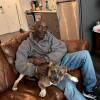After 50 years as a retail and cultural hub in the middle of Harvard Square, The Garage will soon be redeveloped.
“We love the building,” said John DiGiovanni, president of Trinity Property Management. “It was and is a very cool place. But what I would say is cooler than The Garage is Harvard Square.”
DiGiovanni said the old building — which dates back to 1860, when it was a horse stable — is not accessible for patrons with disabilities. He also hopes the redesign will reinvigorate the property to bring in new customers, and that "40 or 50 years from now people will be talking about how cool [the new] place was.”
Construction plans filed with the city show developers plan to begin renovations in 2023, rebuilding the interior while preserving the masonry facades on Mt. Auburn and Dunster streets. Trinity Property Management is working on getting restaurants, retail businesses and office tenants into the new building, though leases have not yet been signed.
But some current tenants and frequent visitors to The Garage are concerned about what this project means for the future of the neighborhood. Comedian, podcast host and Harvard Square frequenter Ken Reid joined GBH’s Morning Edition this week to reflect on his memories of the shopping center.
Reid grew up in Melrose and would ride the Orange Line to spend time at The Garage, where he recalls digging through crates at record stores looking for gold, getting artisan coffee in the pre-Starbucks world, and renting films like "Eraserhead" from Videosmith.
"Almost nothing of the Harvard Square I grew up with exists. Frankly, almost nothing of the Boston I grew up with exists," he said. "That's not necessarily for the worse ... but it is losing character."
Reid said The Garage stood out for its unique businesses that customers couldn't find elsewhere, especially before the Internet. Now he expects some current Garage tenants will shift to online businesses, while he hopes others will find new physical spaces.
One current tenant, Chameleon Tattoo & Body Piercing, is already raising money for relocation expenses .
“We’re working with the owner of the building to hopefully relocate us somewhere in the Harvard Square area,” said Rueben Kayden, a senior tattoo artist who will take over the storied shop after the move as the current owner retires. “That’s the ultimate goal. But that comes with a lofty price.”
Kayden, who has been tattooing at Chameleon for 17 years, said he’s been leaning on the shop’s community. Moving costs may end up clocking in around $80,000-$100,000, he said, not including rent. But Trinity Property Management is working with the business, and clients are offering help in whatever ways they can. Some are donating money, others with carpentry or plumbing skills have offered their time.
“It’s about keeping the culture of tattooing alive in Harvard Square,” Kayden said. “Small businesses are closing constantly, and I feel that there isn’t much flavor left in Harvard. We’re one of the last artistic endeavors available in the area. And it became my personal mission to make sure it stays alive and stays true.”
Below is a transcript of Ken Reid's appearance on GBH's Morning Edition. This transcript has been edited for clarity and length.
Paris Alston: We saw that you, along with many others, were lamenting the closing of The Garage. On Twitter, you said, quote, " Wow, shocked and sad to see this news about The Garage in Harvard Square ," saying you spent so much of your youth there noting that Video Smith alone took probably two full weeks of your life, which is like 336 hours. I did not do that math. I did that math ahead of time.
Ken Reid: Very Harvard of you.
Alston: So walk us through what you remember about The Garage.
Reid: It's sort of a shopping mall. But, you know, growing up in the suburbs, I grew up in Melrose, the last stop on the Orange Line — growing up there and going into Harvard Square and going shopping, that was the closest we got to a one-stop shop. It was it was like a — how would I say this for younger people? — it was like a physical Etsy.
Alston: Yeah, that is a great description.
Reid: It was kind of everything that you thought was cool in a little miniature mall. So Newbury Comics was in there, various businesses over the years, but including the cool clothing store, there was a place called Allston Beat. There was also Video Smith, which was a video store spinoff of Booksmith. And it was kind of the only place that you could rent LaserDiscs. If you wanted to see the movie "Eraserhead," you had to go rent it from there. And I'd take, you know, two buses and a train to rent it, go home, watch it, take two buses and a train to go back. There was also Strawberries, Records and Tapes in the basement and some really good food stores.
It was also in a pre-Starbucks world, and was one of the only places that had a coffee shop. There was a coffee place in there called The Coffee Connection that actually Marc Maron used to work at. And it's where the Starbucks is in there now. You had Dunkin Donuts, but this was like high end. You know, they made espresso.
And then in the basement there, which I believe is where Tasty Burger is now, was Catch a Rising Star comedy club. And that's where people like David Cross, Laura Kightlinger, Janeane Garofalo, Marc Maron, Dana Gould — all of these sort of alt comics from the Boston-Cambridge area — Jonathan Katz, all had shows and performed at that place. So when I was growing up and was a teenager, they used to have a tannoy speaker out on the sidewalk, I think to get people to come in and listen to the show or pay to go see the show. But I was 11 or 12, so I would just sit on the sidewalk and listen to the comedy shows. [Editor’s note: The club was right next to The Garage, though not part of the building.]
Jeremy Siegel: I've been reading Yelp reviews of The Garage, which are pretty entertaining, and a lot of them sort of fall in line with what you've been saying. A lot of people are saying, "If you're stuck in the Square and need to kill time, this is the place to go." One of them cracked me up, they said, quote, "There's nothing here I want and yet I want to die here," they said, "I heart The Garage, even the nasty — word I'm not going to say — bathrooms."
Alston: So Ken, you got to tell us about those bathrooms.
Reid: It was the pretty much the only place in Harvard Square that had a public restroom, and it had a lock. It was the first time I ever encountered one of those bathroom doors that had like a code that you put in. And the code for that door was prized information when I was a teenager, because they changed it often. But, you know, without smartphones, it was like a whisper network.
Siegel: Passing word around.
Reid: "It's 2070 this week, if you need to go to the bathroom."
Alston: That's hilarious.
Reid: You never knew what you would find in there.
Siegel: Hearing you talk about this and reading these reviews, I mean, it is amazing. It just like sounds like a slice of nostalgia in so many people's minds. But I have to ask, why is it called The Garage?
Reid: It was a garage. So it opened in, I think, the 1700s or 1800s as like a horse stall. And then it was a parking garage in Harvard Square until 1972, when they decided they were there was a big movement in Harvard Square, especially to make it less of a car-culture area. And so they they changed it into this mixed-use shopping center, which is even why the ramp when you walk in that was for cars. The reason why it looks like you're outside still when you're inside is because it was designed for cars. And it didn't park that many cars, so it made more sense as this sort of mixed-use place for businesses.
Alston: So with the closure of The Garage, Ken, what's going to happen to the businesses there? Any idea?
Reid: I'm not sure I know. The Chameleon Tattoo, which is was the first legal tattoo parlor in Massachusetts, I believe — certainly in Cambridge — has a GoFundMe going. They were a piercing place before they were a tattoo place.
Newbury Comics, I assume, will probably move into a different location. They've been moving that way in the last few years, moving a lot of their standalone locations into shopping malls, ironically, with this particular instance.
A lot of the businesses have sort of closed and been transient over the years there, as well. But I don't know where they'll go and I don't know where the new place for those kinds of businesses are. ... But a lot of those places probably can move online or, you know, go to places like Etsy.
Siegel: Harvard Square is a place that's going through a lot of change. This is just one marker of that. How do you feel about what you're seeing happen in that area?
Reid: It's a little bit how I imagine people who used to hang around in Times Square in the '70s felt when that got super Disney-fied. Almost nothing of the Harvard Square I grew up with exists. Frankly, almost nothing of the Boston I grew up with exists. That's not necessarily for the worse. There were a lot of sort of sleazy, inappropriate places that I have a nostalgic fondness for as an adult that probably weren't good places to be hanging around. And so I'm kind of glad a generation of kids doesn't have to go to those places to get the cool things that they want. But it is losing character — like Out of Town news is gone — and you know, you're missing the reason to go to Harvard Square. So the reason to go to a place was because there were businesses and experiences you could only physically have there. And when you can either do that virtually or go to any mall that exists or, you know, a mixed-use shopping center and they have 90% of the same stores and restaurants ... unless you're physically in that area already, there's not a big reason to be there.
There was probably 15 news record stores in Harvard Square when I was growing up. And you would go dig through crates and try to find gold — and now you just search it and you can find it. So I can't fault people for embracing the easier and the better. But there is something missing when you physically stumbling upon a thing and that you can only get in that place.










